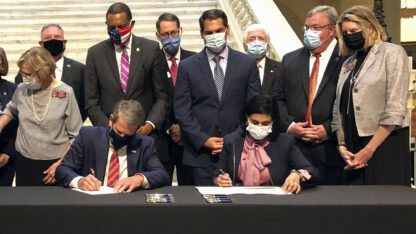More than a year after the state launched the Pathways to Coverage program, offering Medicaid in exchange for work or other state-approved activities, advocates say the program is too difficult for many applicants to navigate. A new report is recommending changes to Pathways as it faces renewal next year.
Enrollment in Pathways to Coverage has been sluggish, with numbers far below the state’s initial forecasts. Estimates suggest that tens of thousands of Georgians could potentially qualify, with just over 4,200 people signing up during Pathways’ first year.
The federal CMS waiver program is for low-income adults who otherwise don’t qualify for Medicaid health insurance in Georgia and who document 80 hours a month of eligible work, education or volunteering activities.
“At the time, I hadn’t been looking for no insurance or nothing like that because I thought I was covered. And to get a letter in the mail to say that your income exceeded, and I’m still working at the same job, you know, that kind of threw me.”
-Kelsey Shields on having her Medicaid coverage cut off
However, a report from the Georgia Budget and Policy Institute shows that too many eligible applicants are being rejected from participating, finding the Pathways system, paperwork requirements and work-verification process too cumbersome.
Kelsey Shields said her Medicaid coverage was cut off after participating for three months.
“At the time, I hadn’t been looking for no insurance or nothing like that because I thought I was covered,” she said. “And to get a letter in the mail to say that your income exceeded, and I’m still working at the same job, you know, that kind of threw me.”
Shields said her pay hadn’t changed and didn’t understand why she was dropped.
Other applicants are seeing long delays in initial application processing, the report found, leaving them unable to access timely medical care.
“It’s just right now the processing time, the waiting time to see if you’re going to be approved and waiting to see if you can get that coverage,” said community insurance enrollment assister Deanna Williams.
Gov. Brian Kemp’s office has maintained Pathways needs more time to grow.
“As we remain committed to this innovative, first-of-its kind program in the nation and as DCH furthers its marketing and outreach efforts, this administration will also continue to explore additional ways to make Georgia Pathways more accessible and efficient as we grow and refine the program,” Kemp spokesperson Garrison Douglas said in a statement.
In August, the state launched a new $10.7 million Pathways advertising campaign to boost awareness of the program.
Officials with the state Department of Community Health say its outreach includes in-person community events, text and online marketing to potentially eligible low-income Georgians.
The Georgia Budget and Policy Institute report found Pathways’ overall spending is mostly going to the state’s technology system known as Gateway, to program administration and to health insurance payments.
The nearly $58 million in combined state and federal spending in the first year amounts to about $13,360 per enrollee, said Leah Chan, Director of Health Justice at Georgia Budget and Policy Institute.
“So, total combined spending on upgrades to that technology is almost five times higher than spending on actual health care benefits for enrollees,” said Chan.
The Pathways program is currently set to expire in Sept. 2025.
The institute is pushing for a number of changes to reduce red tape for state workers and program participants.
Its proposals include eliminating monthly reporting to allow participants to verify activity hours only at the time of initial application and yearly renewal, expanding automated verification of hours using available electronic data, and opening the program to eligible full-time caregivers whose work is currently excluded.
The organization also continues to urge the state to fully expand Medicaid. Georgia is one of 10 states that have not enacted full expansion under the Affordable Care Act.
Nonpartisan and nonprofit policy and research group KFF has estimated roughly 359,000 Georgians could be covered if the state fully expanded Medicaid.
“Georgia could leverage lessons learned from this first year of Pathways to Coverage implementation and really pivot to a program that fully closes the health coverage gap while boosting the state’s economy,” said Knetta Adkins with the organization Georgians for a Healthy Future, a group that favors full expansion.
Kemp continues to support Pathways and Georgia’s other limited expansions of Medicaid coverage as better options for low-income adults across the state.









